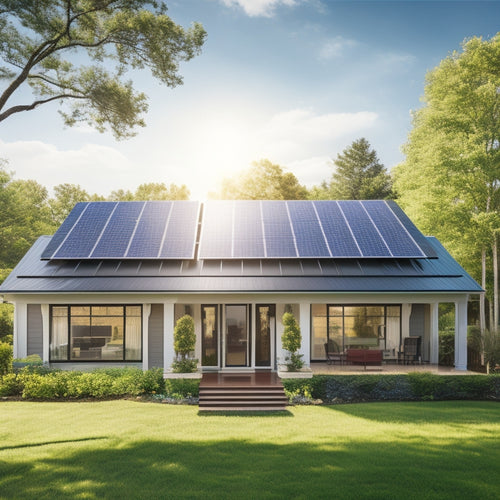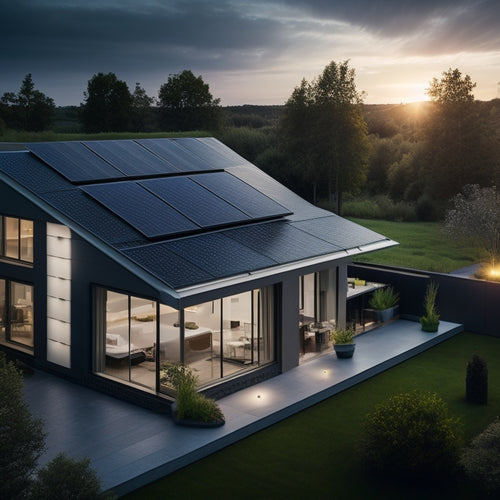
Home Solar Electricity Vs Traditional Energy Sources
Share
Home solar electricity presents distinct advantages over traditional energy sources. By installing solar panels, you can considerably lower your long-term utility costs and forecast more predictable energy expenses, protecting yourself from price hikes. Additionally, solar systems can cut greenhouse gas emissions by up to 80%, contributing to a healthier planet. While initial costs may be higher, long-term savings often outweigh these expenses, especially with tax incentives available. Moreover, solar energy enhances your energy independence by reducing reliance on the grid. Investigate how these factors can shape your energy choices and what additional benefits you might uncover.
At a Glance
- Solar energy significantly lowers long-term energy costs, providing financial stability compared to rising traditional utility rates.
- Home solar systems reduce carbon emissions by up to 80%, promoting a healthier environment and sustainability.
- Solar energy enhances energy independence, mitigating reliance on traditional sources and protecting against price fluctuations.
- Solar panels have low maintenance costs and long lifespans, offering better returns on investment than traditional energy sources.
- Federal and state tax incentives make solar energy more affordable, increasing property value and accelerating return on investment.
Lower Long-Term Energy Costs
When you switch to home solar electricity, you'll likely notice a significant reduction in your utility bills over time.
By conducting an energy needs assessment, you can determine the ideal size of your solar panel system based on your specific usage patterns.
Additionally, various tax incentives can further enhance your savings, making solar an economically attractive option.
Analyzing these factors reveals how solar energy can lead to lower long-term energy costs compared to traditional sources.
Reduced Utility Bills
Switching to solar electricity can greatly reduce your utility bills, often leading to lower long-term energy costs. By utilizing solar energy, you can experience substantial energy savings, as your reliance on traditional energy sources diminishes.
Many utility companies offer incentives for solar installation, which can further enhance your financial outlook. Engaging in budget forecasting and solar budgeting allows you to predict future energy costs accurately. Knowing your household expenses will help you make informed decisions about energy management.
An extensive cost analysis of your current energy usage versus projected solar energy production can reveal significant savings over time. Moreover, with rising utility rates, incorporating solar power into your financial planning guarantees that you're not only prepared for today's energy demands but also for future stability.
You can lock in lower rates while protecting yourself from unpredictable price hikes. Ultimately, shifting to solar electricity isn't just an environmentally friendly choice; it's a strategic move towards financial freedom.
Tax Incentives Benefits
By taking advantage of available tax incentives, homeowners can significantly lower their long-term energy costs when opting for solar electricity. Federal credits, such as the solar Investment Tax Credit (ITC), allow you to deduct a significant percentage of your solar system's cost from your federal taxes.
Many states also offer state incentives that further enhance these financial savings, including tax deductions and rebate programs.
These tax breaks not only reduce your initial investment but can also accelerate the return on investment through lower monthly utility bills. Additionally, solar financing options are often available that align with these incentives, making it more affordable to go solar without a hefty upfront cost.
Moreover, investing in renewable energy can increase your property value. Studies indicate that homes with solar panels sell for more than comparable homes without them, thanks to the long-term energy savings they provide.
Ultimately, by leveraging these tax incentives and rebates, you're not just investing in a solar system; you're setting yourself up for substantial financial benefits over the years while promoting a sustainable energy future.
Environmental Impact Reduction
When you switch to home solar electricity, you're considerably lowering your carbon emissions compared to traditional energy sources.
This change not only contributes to cleaner air but also promotes resource sustainability by reducing dependence on finite fossil fuels.
By adopting solar energy, you actively participate in a more sustainable future.
Additionally, utilizing solar energy can reduce reliance on fossil fuels and greenhouse gas emissions, thereby enhancing environmental health through long-term savings potential.
Lower Carbon Emissions
Home solar electricity systems can greatly reduce carbon emissions compared to traditional energy sources. By utilizing renewable energy from the sun, you can markedly lower your carbon footprint. Studies indicate that residential solar installations can cut greenhouse gas emissions by up to 80% over their lifetime. This reduction stems from the fact that solar power generates electricity without burning fossil fuels, which are major contributors to carbon emissions.
When you opt for solar energy, you're not only reducing your household's reliance on coal, natural gas, and oil but also contributing to a larger shift toward sustainable energy practices. The U.S. Energy Information Administration reports that the electricity sector accounts for around 30% of total carbon emissions. By converting to solar, you play a role in decreasing this statistic.
Additionally, as more homeowners adopt solar technology, the collective impact on reducing carbon emissions becomes substantial. This change not only promotes environmental health but also enables you to take control of your energy consumption.
Ultimately, home solar systems offer a viable path towards a cleaner, more sustainable future, allowing you to enjoy greater energy independence while protecting the planet.
Resource Sustainability Benefits
Utilizing solar energy not only enhances energy independence but also encourages resource sustainability by mitigating environmental impacts. By tapping into renewable sources like solar, you're directly addressing resource availability concerns associated with fossil fuels. This change reduces reliance on depleting resources, nurturing a more sustainable ecological balance.
Advancements in energy storage technologies have made solar energy more viable, allowing you to store excess power for later use. This capability enhances grid integration, ensuring a steady energy supply even when the sun isn't shining. Additionally, policy support for solar initiatives encourages the adoption of clean energy solutions, strengthening your commitment to sustainability.
Community initiatives further amplify these benefits, promoting local solar projects that enhance economic resilience while reducing carbon footprints. By choosing solar, you're not just opting for a cleaner energy source; you're actively participating in a movement towards a more sustainable future.
The cumulative impact of these choices contributes to a healthier planet, minimizes environmental degradation, and supports the shift to a low-carbon economy. Embracing solar energy means aligning your values with actions that cultivate a sustainable and liberated energy environment for generations to come.
Solar Panel Efficiency Ratings
When considering solar panels, understanding efficiency ratings is essential, as it directly impacts energy output.
Various factors, such as temperature, shading, and panel orientation, can affect overall performance.
Additionally, humidity impacts solar cell degradation and can lead to reduced efficiency in humid climates.
Understanding Efficiency Ratings
A significant factor influencing the efficiency of solar panels is their efficiency ratings, which measure how well a panel converts sunlight into usable electricity. These ratings provide a basis for efficiency comparison among different panels, helping you make informed choices. Generally, higher efficiency ratings indicate better energy conversion, meaning more electricity is generated from the same amount of sunlight.
Here's a table illustrating various solar panel efficiency ratings:
| Panel Type | Efficiency Rating (%) | Energy Conversion Rate (kWh/kW) |
|---|---|---|
| Monocrystalline | 15-22 | 1,200-1,800 |
| Polycrystalline | 13-17 | 1,100-1,500 |
| Thin-film | 10-12 | 900-1,200 |
| Bifacial | 20-25 | 1,400-2,000 |
| Building-integrated | 12-17 | 1,000-1,400 |
Factors Affecting Performance
Several factors can greatly impact the performance of solar panels, beyond just their efficiency ratings. First, consider solar panel orientation; panels facing south typically capture the most sunlight.
Geographic location also plays an essential role, as areas with high solar insolation yield better energy production. Weather conditions, like cloud cover or rain, directly influence energy generation.
Installation quality can't be overlooked. Proper mounting and alignment affect how well panels absorb sunlight. Shading effects from nearby trees or buildings can greatly reduce output, so verify your system is placed in a sunlit area.
Maintenance practices, such as cleaning panels and checking connections, help sustain ideal performance. Inverter efficiency is another vital element; a high-efficiency inverter maximizes the conversion of DC to AC power.
Technological advancements continue to expand the horizons of solar energy, improving panel efficiency and durability.
Finally, system sizing must match your energy needs. If your system is too small, you might fall short of your energy goals, while an oversized system may incur unnecessary costs.
Selecting Based on Energy Goals
When selecting an energy source, it's vital to assess your long-term cost savings alongside the environmental impact.
Analyzing the lifetime expenses of solar panels versus traditional energy sources reveals considerable potential savings over time. Moreover, considering how each option affects the environment can guide you in aligning your energy choices with your sustainability goals.
For example, a DIY solar panel system can save up to 50% on installation costs by eliminating labor expenses, leading to even greater savings in the long run when considering DIY solar system costs.
In addition, taking advantage of federal tax credits and state rebates can greatly offset the initial investment in solar energy.
Long-term Cost Savings
Many homeowners find themselves evaluating the long-term cost savings of home solar electricity against traditional energy sources. By considering key factors like solar investment, financing options, and market trends, you can make informed decisions that align with your energy goals.
Here's a comparison table that highlights important aspects:
| Factor | Home Solar Electricity | Traditional Energy Sources |
|---|---|---|
| Initial Costs | Higher upfront costs | Lower upfront costs |
| Maintenance Costs | Low (5-10% annually) | Varies, generally higher |
| System Longevity | 25-30 years | 10-20 years |
| Energy Inflation | Fixed, predictable | Variable, often increasing |
| Return Expectations | 10-20% ROI | 3-5% ROI |
With proper financial planning, the long-term savings from home solar can offset initial investments. You'll benefit from reduced energy bills and protection against energy inflation. Additionally, understanding maintenance costs and system longevity can enhance your return expectations. Ultimately, choosing solar allows you the freedom to control energy expenses, ensuring sustainable savings for years to come.
Environmental Impact Considerations
Given the pressing need for sustainable energy solutions, assessing the environmental impact of home solar electricity versus traditional energy sources becomes vital.
When you look at energy production, solar power stands out for its minimal ecological footprint. Unlike fossil fuels, which contribute considerably to climate change and resource depletion, solar energy utilizes renewable resources that promote habitat preservation.
The carbon footprint of home solar systems is considerably lower compared to conventional energy sources. By adopting solar electricity, you can actively participate in reducing greenhouse gas emissions, aligning with global energy policies and environmental regulations aimed at combating climate change.
Additionally, the use of sustainable practices in solar technology guarantees that energy production doesn't come at the cost of natural ecosystems.
It's important to reflect on how your energy choices impact the environment. By shifting to solar, you're not just investing in your home but also contributing to a healthier planet.
This change can inspire others to rethink their energy consumption and advocate for policies that prioritize renewable resources. In the long run, embracing solar electricity promotes a sustainable future, free from the burdens of traditional energy sources.
Higher Energy Independence Potential
Shifting to home solar electricity can greatly reduce your dependence on the grid.
As you generate your own power, fluctuations in energy prices and supply disruptions become less impactful on your daily life.
This change not only enhances your energy independence but also contributes to a more resilient energy future.
Reduced Grid Dependence
With the rising cost of traditional energy sources and the increasing frequency of power outages, reduced grid dependence through solar electricity offers a persuasive alternative for homeowners seeking greater energy independence.
By utilizing solar energy, you can greatly decrease your reliance on the grid, which is becoming more unstable due to aging infrastructure and natural disasters.
Investing in solar energy storage systems further amplifies this independence. These systems allow you to store excess energy generated during sunny days for use during peak hours or outages, providing a reliable power source when you need it most.
In fact, studies indicate that homes equipped with solar energy storage can reduce grid dependency by up to 80%, ensuring you're not solely reliant on external suppliers.
Additionally, the shift towards solar energy promotes grid resilience. As more homeowners adopt solar technology, the overall demand on the grid decreases, leading to potential reductions in energy costs and improved service reliability.
Frequently Asked Questions
How Long Do Solar Panels Typically Last?
Solar panels typically last 25 to 30 years, depending on durability factors like materials, installation quality, and maintenance. Understanding these elements helps you maximize your investment and achieve reliable energy production over time.
What Maintenance Do Solar Panels Require?
You'd think solar panels require little care, but they need regular maintenance. You should clean the panels and check the inverter periodically to guarantee ideal performance. Neglecting these tasks could lead to decreased efficiency and increased costs.
Can Solar Panels Work in Cloudy Weather?
Yes, solar panels can work in cloudy weather, though their solar efficiency decreases. They still produce energy, albeit at lower levels. On overcast days, you'll still benefit from some energy production, enhancing your energy independence.
Are There Tax Incentives for Installing Solar Panels?
Yes, you can benefit from federal incentives and state rebates that lower installation costs. These financing options enhance energy independence, elevate property value, and provide environmental benefits, especially when considering grid connection advantages.
How Do Solar Batteries Store Energy?
Solar batteries store energy by converting electricity into chemical energy, using various solar battery types. Their energy storage efficiency varies, impacting how much energy you can use when sunlight isn't available, enhancing your energy independence.
Explore More
In assessing home solar electricity against traditional energy sources, the numbers tell a persuasive story. With lower long-term costs and a significant reduction in environmental impact, solar presents a brighter path forward. By understanding solar panel efficiency and aligning your energy goals, you can capture the sun's potential for greater independence. Ultimately, choosing solar isn't just a smart financial move; it's like planting a tree today for a greener tomorrow. Make the switch and watch your future flourish.
Related Posts
-

Renewable Energy Solutions to Reduce Your Carbon Footprint
To reduce your carbon footprint, adopting renewable energy solutions is key. Using solar panels or wind turbines can ...
-

Home Solar Installation Cost
You're considering installing solar panels on your home, and the upfront cost is likely the biggest hurdle standing i...
-

Home Solar Battery
You're opting for a home solar battery that allows you to utilize the power of the sun during the day and use it at n...


